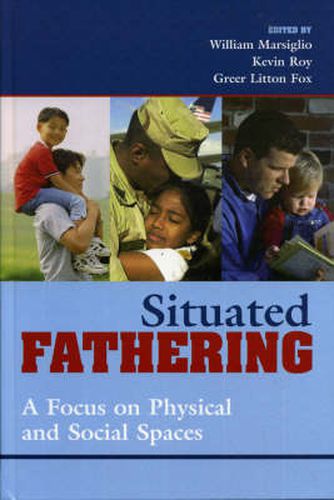Readings Newsletter
Become a Readings Member to make your shopping experience even easier.
Sign in or sign up for free!
You’re not far away from qualifying for FREE standard shipping within Australia
You’ve qualified for FREE standard shipping within Australia
The cart is loading…






When men act as parents they do so in diverse physical and social spaces imbued with symbolic meaning. They father in the military overseas, on the farm, in dilapidated inner cities, immersed in ethnic neighborhoods, navigating idealized places of leisure where families go, as stepfathers in spaces where physical dimensions and family meanings intersect, as nonresident fathers managing less than ideal conditions, rolling across the interstate as long-haul truckers, playing catch alongside the house, managing precious family-time in prison work-release programs, as participants in community fatherhood initiatives, etc. Until now, family scholars had not explicitly theorized and focused on how physical space shapes fathers’ lives. A distinct volume of theoretical and empirical research, Situated Fathering addresses this oversight by proposing a new framework for studying how various contingencies of physical space, in conjunction with social/symbolic issues, affect men’s identities as fathers and their involvement with children. Consistent with public interest in men’s efforts to be there as providers and caregivers, this book explores issues associated with the barriers and supports to involvement that are part of the physical and social environment. Written largely for family scholars and students, it emphasizes a future-oriented perspective by outlining directions for theoretically guided research in specific, often gendered fathering sites.
$9.00 standard shipping within Australia
FREE standard shipping within Australia for orders over $100.00
Express & International shipping calculated at checkout
When men act as parents they do so in diverse physical and social spaces imbued with symbolic meaning. They father in the military overseas, on the farm, in dilapidated inner cities, immersed in ethnic neighborhoods, navigating idealized places of leisure where families go, as stepfathers in spaces where physical dimensions and family meanings intersect, as nonresident fathers managing less than ideal conditions, rolling across the interstate as long-haul truckers, playing catch alongside the house, managing precious family-time in prison work-release programs, as participants in community fatherhood initiatives, etc. Until now, family scholars had not explicitly theorized and focused on how physical space shapes fathers’ lives. A distinct volume of theoretical and empirical research, Situated Fathering addresses this oversight by proposing a new framework for studying how various contingencies of physical space, in conjunction with social/symbolic issues, affect men’s identities as fathers and their involvement with children. Consistent with public interest in men’s efforts to be there as providers and caregivers, this book explores issues associated with the barriers and supports to involvement that are part of the physical and social environment. Written largely for family scholars and students, it emphasizes a future-oriented perspective by outlining directions for theoretically guided research in specific, often gendered fathering sites.